A nice review of Flashforward
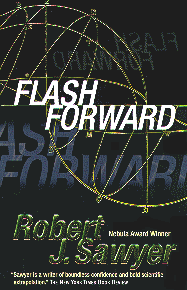
My friend Bonnie Jean Mah just drew this to my attention: A very nice review of my 1999 novel Flashforward. Go me! :)
The Robert J. Sawyer Web Site
Library Journal on Wake: "Sawyer's erudition, eclecticism, and masterly storytelling make this a choice selection."

The Robert J. Sawyer Web Site

The Robert J. Sawyer Web Site
I get awfully tired of the dissing of science fiction. In the last hour, I had to deal with it not once but twice. First, a major publisher doing a nonfiction book followed up in email on a bound galley they'd sent me; they want me to blurb the book. I gave them the blurb, but I added this to my commentary:
Let me gently say that I found your existing back-cover text offensive. Someone at your company wrote:Then a Canadian magazine, which is sponsoring a $110-per-ticket public debate I'd agreed to be part of, sent me their draft ad copy for the event, identifying me as "world-renowned futurist Robert J. Sawyer." My response:
"The stuff of science fiction? Not so. These are actually the reasonable predictions of scientists attempting to forecast a few decades into the future ..."
Which implies that what we science-fiction writers do are UNreasonable predictions -- indeed, wild-ass guesses -- and that "the stuff of science fiction" is a synonym for far-out fantasy. It isn't -- and given that you're publishing a book by a science-fiction writer, and soliciting blurbs from science-fiction writers, I hope you'll re-think this ill-advised cover copy.
The careers of serious science-fiction writers such as myself have been all about "reasonable predictions," and to suggest otherwise is to insult not only your own author but the core readership for this book, by implying they've been foolish to listen to what science fiction has to say. If you mean to say, "The stuff of fantasy," then say that; don't be unfair to science fiction and its practitioners.
It's silly to bill me only as a futurist. I am by far better known as a science-fiction writer. Either say:I can understand people dissing SF out of ignorance, but why people would diss it at the same time they're coming to an SF writer for a favour is utterly beyond me.
"world-renowned science-fiction writer Robert J. Sawyer"
or, if you want to use the word "futurist," use it in addition to "science-fiction writer":
"world-renowned science-fiction writer and futurist Robert J. Sawyer"
I'm adamant about this, I'm afraid. I simply refuse to try to pass as someone who should be associated with your magazine by hiding what I do for a living. I am a science-fiction writer, and you either think there's value in having one such on your panel, in which case I'm happy to participate, or you don't, in which case I'll politely bow out.
The Robert J. Sawyer Web Site
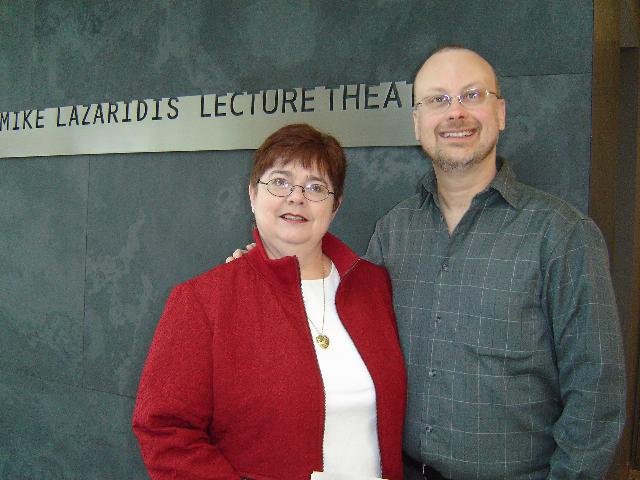
The Robert J. Sawyer Web Site

The Robert J. Sawyer Web Site
Labels: Deaths
And I will -- for much of October 2008.
The Robert J. Sawyer Web Site

The Robert J. Sawyer Web Site

The Robert J. Sawyer Web Site

The Robert J. Sawyer Web Site
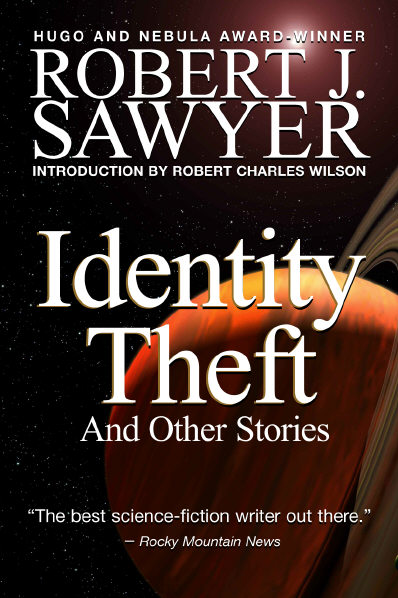
The Robert J. Sawyer Web Site

The Robert J. Sawyer Web Site
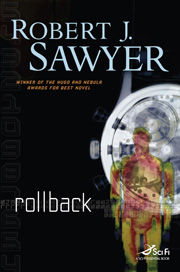
The Robert J. Sawyer Web Site

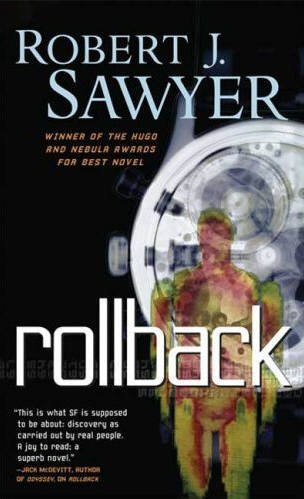
The Robert J. Sawyer Web Site
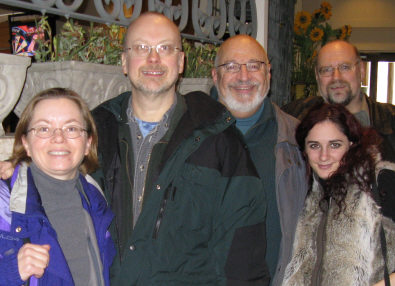
The Robert J. Sawyer Web Site

When Peter Hobson had taken a university elective in taxonomy, the two species of chimpanzees had been Pan troglodytes (common chimps) and Pan paniscus (pygmy chimps).The issue is also touched on in Wake, the novel I'm currently writing.
But the split between chimps and humans had occurred just 500,000 generations ago, and they still have 98.4% of their DNA in common. In 1993, a group including evolutionist Richard Dawkins and bestselling science-fiction writer Douglas Adams published the Declaration on Great Apes, which urged the adoption of a bill of rights for our simian cousins.
In took thirteen years, but eventually their declaration came to be argued at the UN. An unprecedented resolution was adopted formally reclassifying chimpanzees as members of genus Homo, meaning there were now three extant species of humanity: Homo sapiens, Homo troglodytes, and Homo paniscus. Human rights were divided into two broad categories: those, such as the entitlement to life, liberty, and freedom from torture, that applied to all members of genus Homo, and other rights, such as pursuit of happiness, religious freedom, and ownership of land, that were reserved exclusively to H. sapiens.
Of course, under Homo rights, no one could ever kill a chimp again for experimental purposes -- indeed, no one could imprison a chimp in a lab. And many nations had modified their legal definitions of homicide to include the killing of chimps.
Adriaan Kortlandt, the first animal behaviorist to observe wild chimpanzees, once referred to them as "eerie souls in animals' furs." But now Peter Hobson was in a position to see how literally Kortlandt's observation should be taken. The soulwave existed in Homo sapiens. It did not exist in Bos taurus, the common cow. Peter supported the simian-rights movement, but all the good that had been done in the last few years might be undone if it were shown that humans had souls but chimps did not. Still, Peter knew that if he himself did not do the test, someone else eventually would.
Even though chimps were no longer captured for labs, zoos, or circuses, some were still living in human-operated facilities. The United Kingdom, Canada, the U.S., Tanzania, and Burundi jointly funded a chimpanzee retirement home in Glasgow -- of all places -- for chimps that couldn't be returned to the wild. Peter phoned the sanctuary, to find out if any of the chimps there were near death. According to the director, Brenda MacTavish, several were in their fifties, which was old age for a chimp, but none were terminal. Still, Peter arranged to have some scanning equipment shipped to her.
"Where there is fire, there is smoke. And in that smoke, from this day forward, my people will crouch and conspire and plot and plan for the inevitable day of Man's downfall -- the day when he finally and self-destructively turns his weapons against his own kind. The day of the writing in the sky, when your cities lie buried under radioactive rubble! When the sea is a dead sea, and the land is a wasteland out of which I will lead my people from their captivity! And we will build our own cities in which there will be no place for humans except to serve our ends! And we shall found our own armies, our own religion, our own dynasty! And that day is upon you NOW!"
-- Caesar, Conquest of the Planet of the Apes
The Robert J. Sawyer Web Site

For the past century, the advice to the overweight and obese has remained remarkably consistent: consume fewer calories than you expend and you will lose weight. This prescription seems eminently reasonable. The only problem is that it doesn't seem to work. Neither eating less nor moving more reverses the course of obesity in any but the rarest cases.The above is by Gary Taubes, author of the new book The Diet Delusion.
...
There is considerable evidence that the obesity epidemic is caused by a hormonal phenomenon, specifically by the consumption of refined carbohydrates, starches and sugars, all of which prompt (sooner or later) excessive insulin secretion. Insulin is the primary regulator of fat storage. When insulin levels are elevated, fat accumulates in our body tissue; when they fall, fat is released and we use it for fuel. By stimulating insulin secretion, carbohydrates make us fat; by driving us to accumulate fat, they increase hunger and decrease the energy we expend in metabolism and physical activity. In short, obesity is caused not by overeating or sedentary behaviour, but by hormonal malfunctioning triggered by the consumption of particular types of carbohydrate-containing foods.
Obesity researchers, nutritionists and health authorities have refused to contemplate this scenario, partly because it would imply that diet-book doctors advocating carbohydrate-restricted diets -- Robert Atkins et al -- were right all along. Instead, these alleged experts and guardians of our health have wasted a good part of a century on research based on a high-school misconception, watching their compatriots grow ever fatter while blaming everyone but themselves. In the process, they have created a field of clinical medicine that functions more like a religion than a science. It is time to put science back in charge.
The Robert J. Sawyer Web Site

The Robert J. Sawyer Web Site

The Robert J. Sawyer Web Site

The Robert J. Sawyer Web Site
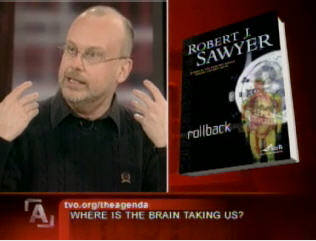
"Science fiction is a Distant Early Warning System for social upheaval."
"The role of the science-fiction writer is to be the conscience of the technological age."
-- Robert J. Sawyer, author, interviewed by Steve Paikin, TVOntario’s The Agenda, 14 Jan. 2008.
The Robert J. Sawyer Web Site

The Robert J. Sawyer Web Site
Coming in May 2008 to a bookstore near you:

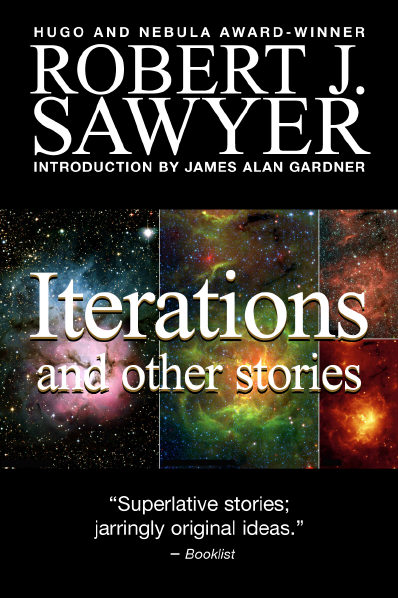
The Robert J. Sawyer Web Site

The Robert J. Sawyer Web Site


The Robert J. Sawyer Web Site

The Robert J. Sawyer Web Site

The Robert J. Sawyer Web Site

The Robert J. Sawyer Web Site

The Robert J. Sawyer Web Site

The Robert J. Sawyer Web Site

The Robert J. Sawyer Web Site

The Robert J. Sawyer Web Site

The Robert J. Sawyer Web Site

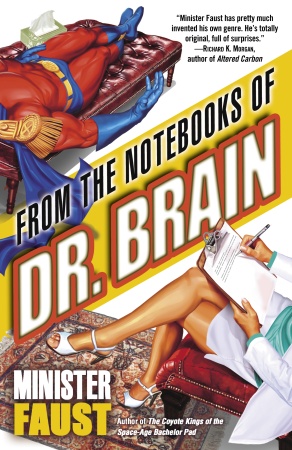
The Robert J. Sawyer Web Site
My friend Mark Leslie Lefebvre sent me an interesting question today:
I also had a question about remainders (since I know that some of your older titles or books that have gone into paperback have gone into remainder status -- after an incredibly great run as a traditional trade book, of course). Remainders/Bargain Books are a win-win situation for consumers and for bookstores (lower retail, higher margins) but what about the author?A good question! Tor's boilerplate remainder clause says this:
When Tor remainders your old stuff, is there any sort of compensation given to the author (ie, some sort of token royalty payment for that liquidated stock?) I've only seen this from a customer's and a bookseller's perspective, so was curious as to the author's side of things.
Remainder Sales. On copies of any edition of the Work sold in a remainder sale or a special stock reduction sale, a royalty of ten percent of the excess, if any, of the net amount received by the Publisher over the average cost of copies of that edition.Now, let's try to parse that out. Most Tor hardcovers have a cover price of US$24.95, and on copies sold in the US, authors get 10% of that on the first 5,000 copies (which is $2.50 a copy), 12.5% on the next 5,000 copies (which is $3.12 a copy), and 15% on anything over 10,000 copies (which is $3.75 a copy). The deal is similar with all other commercial SF publishers.
The Robert J. Sawyer Web Site
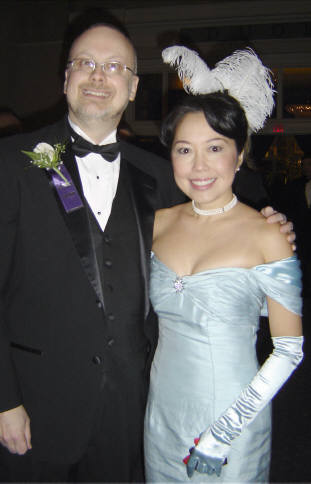
The Robert J. Sawyer Web Site

Toronto -- American by birth but Canadian by choice, publisher Robert Fitzhenry died at home in his sleep on Thursday, Jan. 3. He was 89.As another science-fictional connection, it should be noted that Fitzhenry & Whiteside used to be the Canadian distributor of Ace Books.
A wordsmith and an entrepreneur, he moved across the border in 1966 and co-founded Fitzhenry & Whiteside, a significant distribution company that represented Harper & Row (now part of HarperCollins) and other American houses, especially in the 1970s and 1980s. Mr. Fitzhenry published a number of Canadian reference books, including the Funk & Wagnalls Canadian College Dictionary and the Fitzhenry & Whiteside Thesaurus, Book of Quotations, Book of Canadian Facts and Dates and Trees in Canada.
He had been in ill health since suffering the first of two serious strokes in 1995. Predeceased by wife Hilda and daughter Bridget, he is survived by daughters Sharon and Hollister Doll (Holly) and three grandchildren. There will be a private family funeral followed by a public memorial service at a later date.

The Robert J. Sawyer Web Site
Labels: Deaths

"Sawyer, who has won Hugo and Nebula awards, may well win another major SF award with this superior effort." --Publishers Weekly (starred review, denoting a book of exceptional merit)Much more about Rollback, including sample chapters, more reviews, and a book-club discussion guide, is here.
"An early candidate for sci-fi book of the year." --Kansas City Star (which also included Rollback on its Top-Five SF Books of the Year list)
"Rollback gets my vote as SF novel of the year. A joy to read." --Jack McDevitt, author of Odyssey
"I highly recommend Robert J. Sawyer's Rollback. It's a shoo-in to be short-listed for next year's major awards." --SciFiDimensions
The Robert J. Sawyer Web Site

The Robert J. Sawyer Web Site

The Robert J. Sawyer Web Site

The Robert J. Sawyer Web Site


The Robert J. Sawyer Web Site

The Robert J. Sawyer Web Site


The Robert J. Sawyer Web Site

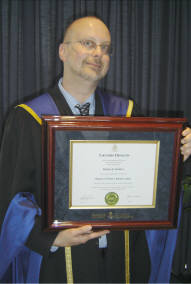
The Robert J. Sawyer Web Site